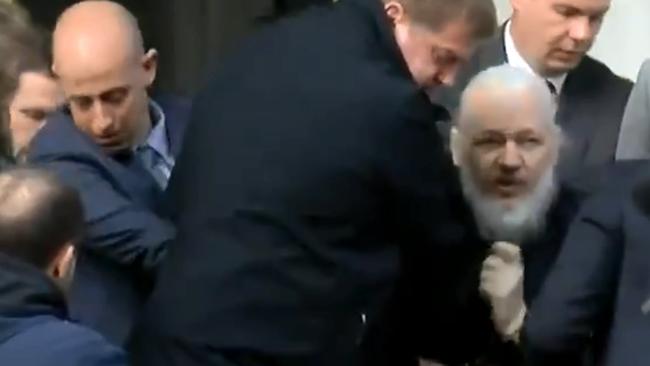Why embassy staff loathed ‘The Guest’ Julian Assange
Why embassy staff loathed Julian Assange, “The Guest” who behaved like a moody teenager.
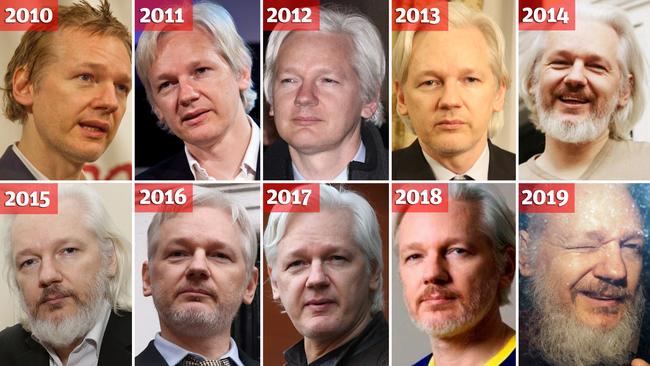
His hosts would call him “The Guest”, but over nearly seven years staff and security at the Ecuadorean embassy in Knightsbridge shared eight rooms and a corridor with a tenant they came to fear and despise.
Julian Assange, 47, grew increasingly erratic as the days and months passed, flitting from bouts of adolescent behaviour to depressive moods.
Complaints against him ranged from his playing football and skateboarding in the hall to attempting — even effecting — regime change in foreign countries.
On Thursday, after Assange’s dramatic arrest, Ecuadorean officials continued to heap accusations against Mr Assange over his conduct within the embassy, including hacking their devices to spy on diplomatic correspondence and smearing excrement on the walls.
Maria Paula Romo, the interior minister, said: “During his stay at the Ecuadorian embassy, during the government of the former president Rafael Correa, they tolerated things like Mr Assange putting faeces on the walls of the embassy and other types of behaviour of this kind that is far removed from the minimum respect a guest should have in a country which has generously welcomed him.”
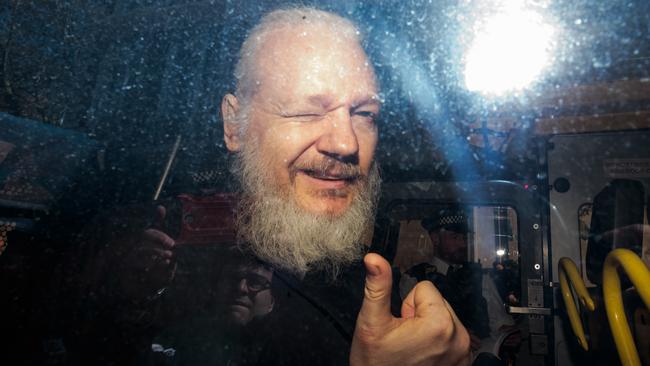
The Wikileaks founder has been repeatedly accused of hacking systems within the embassy, and the president of Ecuador recently intimated a link between a personal hack and Mr Assange, which Wikileaks has vehemently denied.
“A one-man boutique hotel”
His sleep patterns and rumoured poor hygiene led one diplomat to tell The Times in 2015: “Day has been turned into night, night into day. It is virtually impossible to conduct a normal diplomatic relationship when you are also functioning as a one-man boutique hotel.”
Relations between Britain and Ecuador were plunged into deep freeze, leaving them unable to conduct day-to-day diplomacy. As part of the negotiations to oust Mr Assange, Ecuador sought Britain’s assurance that it would help with what it saw as the probable backlash from Assange’s eviction: cyberassault against the country from Wikileaks’ allies. Britain has vowed to assist Ecuador with cybersecurity.
Mr Assange arrived during the European football championships in 2012 wearing biker gear and was swiftly granted asylum.

Celebrity guests
Soon after he strode in, a parade of celebrity guests and other high-profile visitors began to arrive. Jemima Khan, the socialite turned film director, was among them but would later renounce Mr Assange — accusing Wikileaks of misinformation and calling it a cult.
After losing her share of $AU440,000 in bail surety, Ms Khan said of Mr Assange: “It would be a tragedy if a man who has done so much good were to end up tolerating only disciples and unwavering devotion, more like an Australian L Ron Hubbard.”
Lavish takeaways
Inside the embassy, with only a treadmill for exercise and a sunlamp as a vitamin D substitute, Mr Assange lived on lavish takeaways — the embassy spent $AU16,500 in the first year alone — while Eric Cantona, Lady Gaga and Vivienne Westwood were among his visitors. The setting, a stone’s throw from Harrod’s, the luxury department store, seemed fitting and musicians including PJ Harvey, Brian Eno and the rapper MIA also stopped in. Guests were said to have made him dance with them to keep his spirits up.
On July 3 each year, a rag-tag bunch of followers from around the world would gather on the street outside the red-brick Victorian mansion block to celebrate his birthday with cake, balloons and banners.
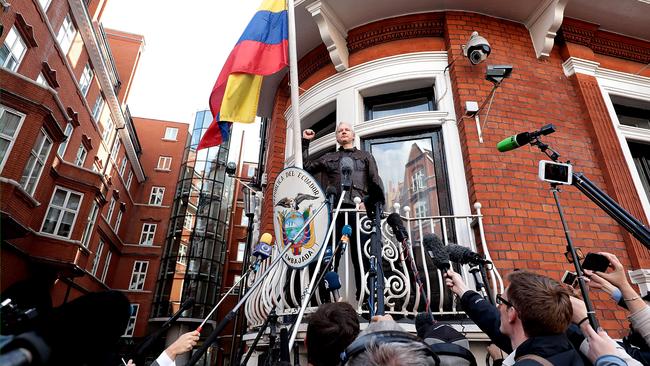
“Evita” moment
His “Evita” moment came as he addressed hundreds of supporters and media outlets from around the world from the small balcony at a front window, calling on the US to end its “witch-hunt” against Wikileaks.
“The Guest” survived three ambassadors, a bid by William Hague as foreign secretary to suspend the diplomatic status of the embassy and storm the building, and health problems including a rotten tooth and respiratory issues. But could not get beyond the intensive efforts to force him out that began under Ecuador’s new president, Lenin Moreno, in 2017.
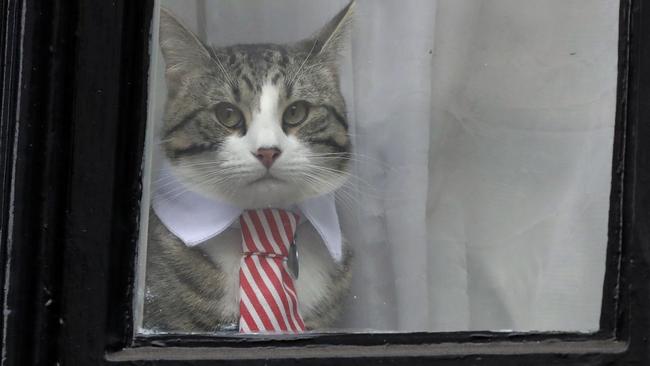
The embassy imposed strict new conditions, stripping him of internet and telephone access and restricting his visitors to doctors and lawyers.
He was banned from the balcony and ordered to clean up after his cat, as well as clean his bathroom and do his laundry.
Visitors were searched and forced to hand over identifying codes for any digital devices brought in, and surveillance was ramped up in a bid to make him so uncomfortable he would leave.
Such was the campaign to force Mr Assange out that in January this year Wikileaks deemed it necessary to issue a 5000-word email, ironically marked “not for publication”, of statements it deemed “false and defamatory”. These included: “It is false and defamatory to suggest that Julian Assange stinks.”
In 2017, Mr Assange said that the US was painting him as a “fallen angel”, which seemed apt as he was dragged away from the embassy on Thursday yelling “resist”.
The Times
